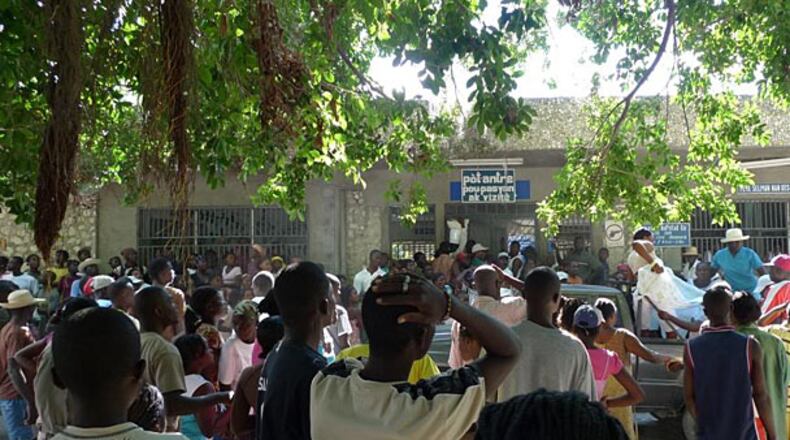PÉTION-VILLE, Haiti – Atlantan Jon Steele has been coming to Haiti three or four times a year for the past decade and is program director of klorfasil.org, which dispenses granulated chlorine for use in water purification.
He and colleague Mike Coughlin arrived here Saturday night on a donated jet with 1,000 pounds of materials – enough to purify 10 million to 40 million gallons of water.
But even after coming here for so many years and witnessing so many of the island nation’s natural disasters, he was at a loss for words as he drove around Port-au-Prince on Sunday morning, his first full day in the city.
“I’m used to the situation, but my sense is that this catastrophe – it’s impossible for me to comprehend,” Steele said. “I can’t even think straight. My mind is boggled.”
Steele and Coughlin are going to two of the hardest-hit areas, including the towns of Léogâne and Jacmel, and estimate they’ll be here for two weeks.
“I’m used to Haiti, but I’m not sure that the country can overcome this.”
Among the post-quake efforts in Haiti, concerns are mounting that fuel will run out with some estimates pegged at three days’ worth of gasoline left (as of Sunday).
But fuel is just one of many concerns.
Nearly 60 miles north of Port- au-Prince, the capital, Emory student Nicole Dionne is stationed at l’Hôpital Albert Schweitzer in Deschapelles.
Dionne, a second-year Masters of Public Health student at Emory University, described the scene via e-mail text Sunday:
“There are more than 250 patients waiting for surgery, many with multiple broken bones and other trauma. American surgeons have finally been allowed to land in Port-au-Prince today and will be arriving at the hospital shortly to help relieve the Haitian staff.
“We are still without functioning phone lines, so many people here are waiting impatiently to hear news from missing friends and family.”
The hospital, which serves 300,000 patients a year in the surrounding l’Artibonite Valley, didn’t suffer any damage, Dionne said, and injured people from Port-au-Prince have been flooding the hospital.
“Patients were arriving here by any means possible – motorcycles, the back of pickup trucks, buses,” she wrote via e-mail text, which remains the most reliable means of communication here. “Patients waiting to be seen by doctors – many with makeshift splints and other bandages.”
Dionne has been working on her thesis on the hospital. She has been back and forth since September, and she has been stationed there continuously there for the past five weeks.
When the quake hit, she didn’t immediately realize what was happening.
“Being from the East Coast, I didn’t really understand what was happening until I saw the buildings around us start to collapse,” wrote Dionne, who is from Maine but moved to Atlanta for grad school. “Luckily, no one I was with in the car was injured. We ran down the street because a three-story school had collapsed and people were trapped inside.”
Almost a week later, people are still pouring into Deschapelles and other cities from Port-au-Prince.
The roads in the capital are clogged with cars trying to leave.
Though CARE officials have said the government is encouraging people to leave if they have relatives elsewhere, the panic has led to massive lines of cars and people at filling stations throughout the region.
Indeed, Steele, who is with the water purification organization, expressed concern for their efforts.
“There’s hundreds of trucks here, and now we’re wondering about the fuel.”
RELATED: Haitian quake reverberates in Atlanta
About the Author
The Latest
Featured


